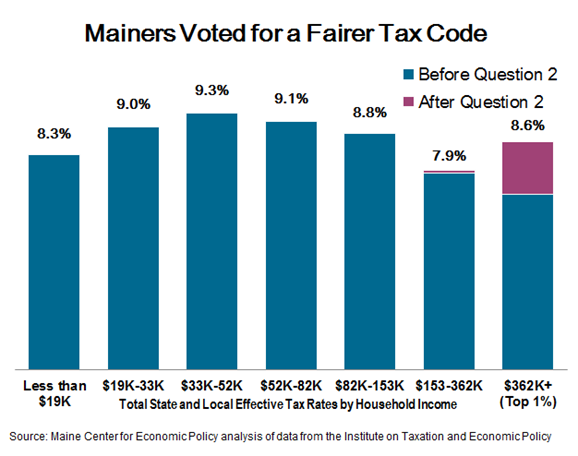Augusta, Maine (Monday, March 20, 2017) State legislators on the taxation committee will hold a public hearing today on several bills that would roll back the tax to pay for education enacted under Question 2, the ballot initiative passed by Maine voters in November 2016. As a result of Question 2, the state will have the capacity to provide 55% of school funding mandated by voters previously in 2004. The proposals before the taxation committee today would give huge tax breaks to the wealthiest Mainers, shift costs to property tax owners, and undermine the state’s ability to fulfill its commitment to Maine schools. The bills are LD 291, LD 337, LD 551, LD 829, and LD 851.
Maine Center for Economic Policy Analyst Sarah Austin is one of dozens of Mainers testifying in opposition to these bills in Augusta today.
“Maine voters just told us they support building a stronger public education system by asking wealthy Mainers to pay their fair share. Voters indicated they want more opportunities for Maine students, not less,” said Sarah Austin.
“Now that Question 2 is law, Maine has a bona fide path to fully funding education in 2018.
“The wealthiest 1% of Maine households will still pay a lower effective tax rate than the middle 75% of Maine families who have annual income between $19,000 and $153,000. Walking back the surcharge in any way will serve to further privilege wealthy Mainers, shift more costs onto low- and middle-income families, and jeopardize schools.
“State cuts to revenue sharing and general assistance and failure to fully fund the state’s share of education costs have shifted more costs onto local property taxpayers — both businesses and families. In fact, Maine property taxes are nearing historic highs and most businesses stand to gain from less pressure on local property taxes thanks to the education tax.
“Voters recognized the need to stop the shift to property taxpayers. The pressure to raise property taxes eases when the state fully funds its share of education.
“I urge this committee to respect the will of Maine voters, protect Maine’s ability to invest in our future by fulfilling our commitment to public education, and stop the trend of tax cuts for the wealthy at the expense of families and communities.”
The following materials were provided to committee members as part of MECEP’s testimony:



